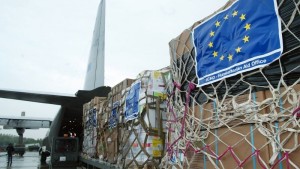Refugee crisis hits foreign aid budgets

European food aid being delivered.
Rising numbers of European and other countries are using their foreign aid budgets to meet the costs of addressing the global refugee crisis, according to a new report.
The research published this week by Concord, the peak body for European NGOs engaged in relief and development work, reports on an emerging trend among European nations to divert aid budgets from sustainable development to domestic costs associated with hosting refugees and asylum seekers.
The report says much expenditure itemised by EU countries as aid does not translate into a material transfer of resources to developing nations or to poor and marginalised people.
This is not the first time that NGOs have reported that EU monies are increasingly being spent on tackling the refugee crisis and border security, rather than fighting poverty and inequality.
Concord collated Organisation for Economic Co-operation and Development (OECD) data and also used updated nation figures to compile the report.
It says some EU countries are mis¬reporting some of their official development assistance (ODA) expenses by including costs which, under existing guidelines, should not have been counted.
Among examples cited are the reporting of non¬-eligible migration-¬related expenses in Spain and Malta and the misreporting of refugee costs in Hungary.
The report found that in 2014, the EU28 and the European institutions inflated their aid by €7.1bn ($US7.6bn or $A10.5bn), which represents about 12 per cent of all aid flows.
It said some countries inflate aid more than others. While the percentage of inflated aid for Luxembourg is estimated at 0.3 per cent of the country’s total aid, and at 0.5 per cent for the UK, in contrast it is 50.6 per cent for Malta, 30.9 per cent for Austria and 27.2 per cent for Portugal.
The EU institutions are also guilty of cost shifting foreign aid having “inflated” it by 9.9 per cent.
The Concord reports says that while helping people arriving in Europe in great need is “a moral imperative”, this does not mean that funding for refugees in-country is something that should be reported as ODA.
Luxembourg, Poland and Bulgaria have already decided not to report refugee costs as ODA.
According to the OECD, only money spent during the first 12 months of stay should be reported as ODA. But other countries account refugee-related expenses as ODA.
Some countries include all the costs relating to asylum seekers, regardless of whether they are granted refugee status or not. In most cases, they stop counting once a decision has been made. In other cases, only the costs incurred after a decision has been made are included.
For example, Spain is using ODA to support and equip security forces in transit countries, essentially building walls in Ceuta and Melilla, its North African enclaves.
Sweden, which is expecting as many as 190,000 asylum seekers this year, is considering using up to 60 per cent of its foreign aid budget in 2016 to fund refugee reception.
Malta has also traditionally used almost half its aid budget to pay for migrant detention centres. This expenditure should not be reported as ODA under existing guidelines, Concord says.
Bundling together the reporting of refugee costs makes it difficult to ensure member states are complying with existing guidelines, the report says.
It also points out that if EU countries use ODA to pay refugee costs, there is a risk that it might be at the expense of people in developing countries.
The report also found that climate finance was often counted twice, towards both climate and development targets, when in practice the EU aid budget has stagnated for the last few years and is not meeting either development or climate needs individually.
The report recommends that countries and EU institutions stop inflating aid, and exclude inflated aid items from ODA reporting: refugee costs, imputed student costs, tied aid, interest on loans and debt relief.
It says countries should agree on a joint EU definition of “climate finance” so that aid and climate commitments can be measured accurately and independently, and are financed additionally; and, that they stop inflating refugee costs with non-¬reportable expenses as ODA.
In Australia, Treasurer Joe Hockey cut $7.9 billion over four years in his first budget last year, followed by a further $3.7 billion in December’s mid-year budget review.
Observers say the cuts are both the largest ever multi-year aid cuts and the largest ever single year cuts, while OECD figures find that 2016 will see the government’s foreign aid spending drop to its lowest levels since records began in 1960.
Skye Doyle
AMES Australia Staff Writer












